

Iranian nuclear facilities may have largely survived attack, initial report says.
UN chief welcomes Trump's announcement of Israel-Iran ceasefire and urges Israel and Iran to fully respect the ceasefire and to stop fighting.
UNITED NATIONS - The UN Security Council will meet Sunday to discuss US strikes on Iran's nuclear sites as Russia, China and Pakistan proposed the 15-member body adopt a resolution calling for an immediate and unconditional ceasefire in the Middle East.
It was not immediately clear when it could be put to a vote. The three countries circulated the draft text, said diplomats, and asked members to share their comments by Monday evening. A resolution needs at least nine votes in favor and no vetoes by the United States, France, Britain, Russia or China to pass.
The world awaited Iran's response on Sunday after President Donald Trump said the US had "obliterated" Tehran's key nuclear sites, joining Israel in the biggest Western military action against the Islamic Republic since its 1979 revolution.
Iran requested the UN Security Council meeting, calling on the 15-member body "to address this blatant and unlawful act of aggression, to condemn it in the strongest possible terms."
Israel's UN Ambassador Danny Danon said in a statement on Sunday that the US and Israel "do not deserve any condemnation, but rather an expression of appreciation and gratitude for making the world a safer place."
UN Secretary-General Antonio Guterres on Saturday branded the US strikes on Iran as a "dangerous escalation in a region already on the edge – and a direct threat to international peace and security."
"At this perilous hour, it is critical to avoid a spiral of chaos. There is no military solution. The only path forward is diplomacy. The only hope is peace," Guterres said in a statement.
Reuters

The global economy could be badly damaged by the United States' bombing of Iran, experts have said.
As the dust settled on explosions at three of Iran's main nuclear facilities, investors were watching closely for hints about how Teheran will respond.
If the Islamic Republic choses to hit back vigorously, or if it decides to close the Strait of Hormuz seaway, the global economy could be hit almost instantly with fast-rising oil prices and resulting high inflation.
"We'll see how Teheran responds, but the attack likely puts the conflict on an escalatory path," Bloomberg news agency's economics analysts wrote in a report. "For the global economy, an expanding conflict adds to the risk of higher oil prices and an upward impulse to inflation."
The precarious situation in Iran has already prompted the World Bank, the Organization for Economic Cooperation and Development, and the International Monetary Fund to say they will downgrade their global growth forecasts.
And an early indication that investors expect oil prices to rise quickly was evident on Sunday, when a derivative product that allows them to speculate on price swings in crude oil surged 8.8 percent on IG Weekend Markets.
IG strategist Tony Sycamore told Bloomberg he expected WTI crude oil futures to open at around $80 per barrel on Monday. But he said if the Strait of Hormuz, which connects the Persian Gulf to the Arabian Sea, is closed because of the conflict, crude oil prices could rise beyond $130 a barrel. That would likely cause the US Federal Reserve to shelve any thoughts it may be having of cutting interest rates, analysts said.
Iran's Foreign Minister Abbas Araghchi has said his nation will take any action it deems necessary to defend itself but he has not said specifically whether it will close the Strait of Hormuz.
Around one-fifth of the world's oil supply flows through the strait that lies between Iran and neighbors including Saudi Arabia.
Qatar ships around 20 percent of the word's liquefied natural gas through the strait and any disruption would push those prices up very quickly.
Sky News noted that conflict in Iran could also have a huge impact on global shipping, with cargo ships transporting goods and appliances likely to encounter additional costs as a result.
The situation has already led insurance companies to hike premiums on policies covering passage through the region, which will lead to consumers paying higher prices.
Sarah Schiffling, an academic at the Hanken School of Economics in Helsinki, Finland, told Sky News turbulence in the Middle East will force "many ships to go the long way around Africa on routes between Asia and Europe, which adds one to two weeks of travel time and around $1 million in cost per journey".
Investors are likely to respond to the situation by looking for safe places to put their money, with a selloff of equities likely and investment in the dollar and in safe-haven assets expected.
Mark Spindel, chief investment officer at Potomac River Capital, told the Reuters news agency: "I think the markets are going to be initially alarmed, and I think oil will open higher … It's going to raise uncertainty and volatility."
Carole Nakhle, chief executive of Crystol Energy, told the BBC: "The US attacks have pushed the conflict to a new level and many fear it will only make a bad situation worse."
earle@mail.chinadailyuk.com
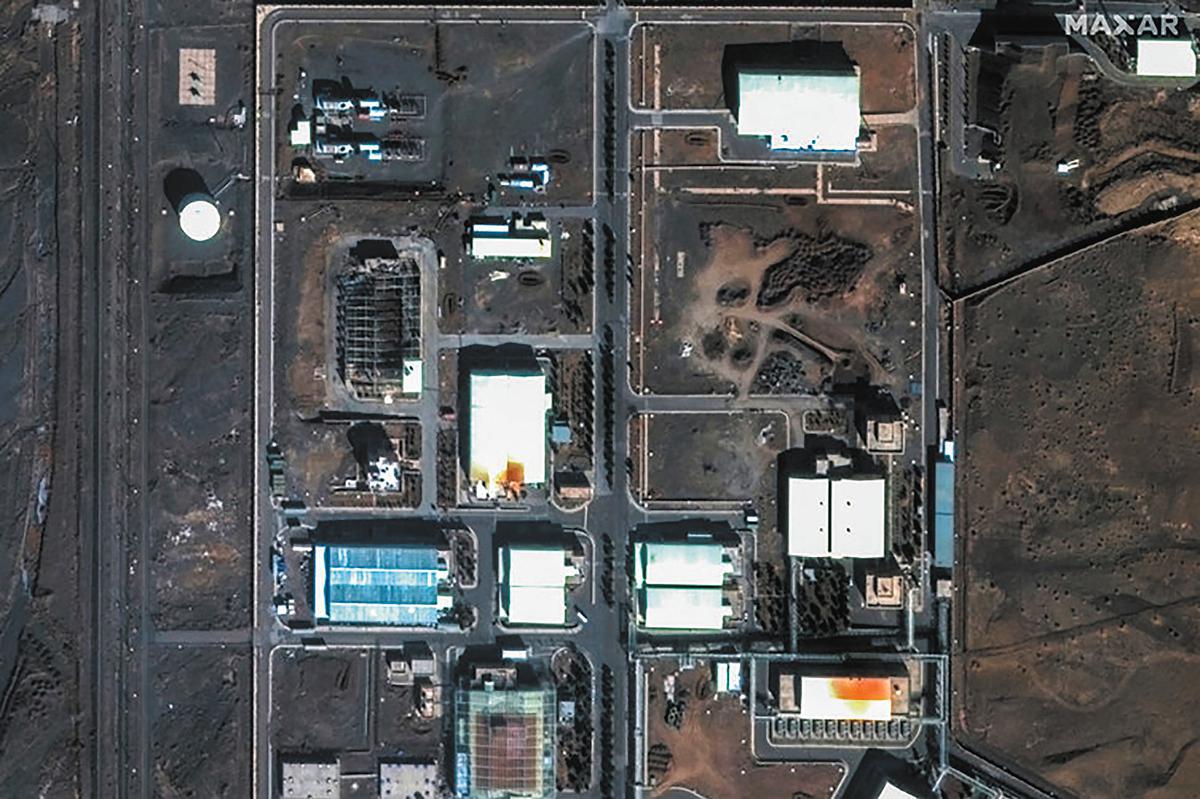
China has strongly condemned the United States' attacks on Iran and the bombing of nuclear facilities under the safeguards of the International Atomic Energy Agency, according to a statement released on Sunday by the Chinese Foreign Ministry.
The US attacked three sites in Iran early on Sunday, inserting itself into Israel's conflict with Iran aimed at destroying the latter's nuclear program.
The Atomic Energy Organization of Iran confirmed that the attacks took place at its Fordow, Natanz and Isfahan sites. Iran and the IAEA, the United Nations nuclear watchdog, said there were no immediate signs of radioactive contamination at the three locations.
The actions of the US seriously violated the purposes and principles of the UN Charter and international law, and have exacerbated tensions in the Middle East, the Foreign Ministry said.
China calls on the parties to the conflict, and Israel in particular, to reach a ceasefire as soon as possible, ensure the safety of civilians and start dialogue and negotiation, the statement said, adding that China stands ready to work with the international community to pool efforts and uphold justice, and work for restoring peace and stability in the Middle East.
In a national address at the White House after the attacks, US President Donald Trump said: "Our objective was the destruction of Iran's nuclear enrichment capacity and a stop to the nuclear threat. ... There's no military in the world that could have done what we did tonight."
He said that Iran's key nuclear sites have been "completely and fully obliterated".
Iran reportedly responded to the US attack by firing 40 missiles targeting multiple sites in Israel, in the latest escalation of hostilities between the two Middle East nations. Since June 13, Israel has conducted large-scale strikes on Iranian military and nuclear facilities. In retaliation, Iran launched multiple missile and drone attacks on targets in Israel.
Iranian President Masoud Pezeshkian condemned the US attacks, saying, "This aggression shows that the United States is the primary instigator of ... hostile actions against the Islamic Republic of Iran."
UN Secretary-General Antonio Guterres said he was "gravely alarmed" by the US' use of force. "There is a growing risk that this conflict could rapidly get out of control — with catastrophic consequences for civilians, the region and the world," he said in a statement.
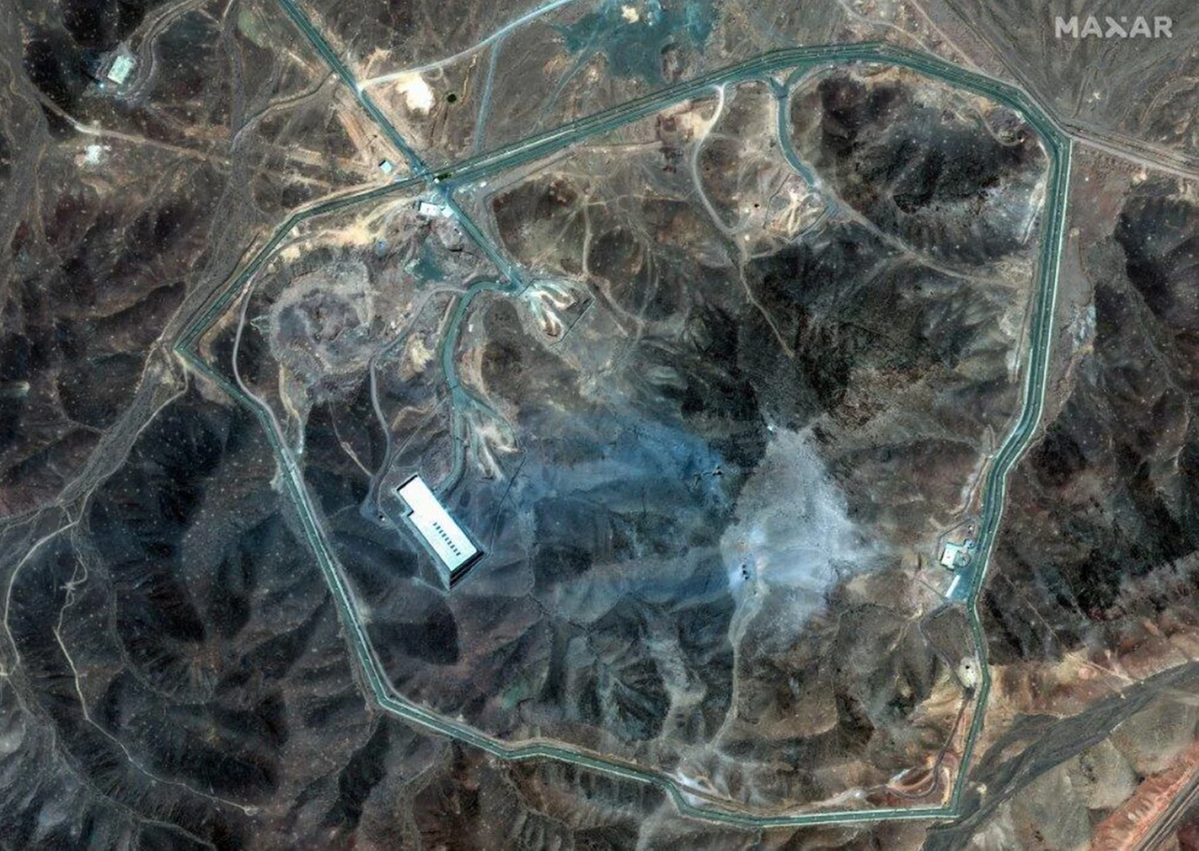
Experts said the US attacks could trigger more uncertainty in the region and undermine global peace.
Jack Midgley, an adjunct associate professor at Georgetown University's Center for Security Studies in Washington, DC, said the US strikes will trigger more uncertainty in the region.
"Trump's speech after the US strikes on Iran set a triumphal and menacing tone that is both premature and unwise. The political and security-related consequences of these imprudent strikes will emerge over months and cannot easily be foreseen," he said.
Countries in the Middle East will now have to reevaluate their relationships with the US, he said. Far from creating regional stability, Trump's attacks on Iran are likely to foment global instability and risk, Midgley added.
Ding Jun, director of the Middle East Studies Institute at Shanghai International Studies University, said the US airstrikes alone are unlikely to compel Iran to back down.
"Iran is now targeting Israel, with the potential for direct attacks on US bases and other assets in this region. If that happens, the risk of the conflict escalating and spreading across the region would significantly rise," he said.
Ding said that Trump's approach to Iran risks dragging the US into another protracted conflict, an outcome that should serve as a rational and sobering warning, as some US lawmakers have already condemned his action as "unconstitutional".
Zhu Yongbiao, director of the Center for Afghanistan Studies at Lanzhou University in Gansu province, criticized the US for repeatedly resorting to military force to address regional issues.
"From Afghanistan and Iraq to Syria and Iran, the US has attempted to use military power to push for regime change and advance its own interests. But these interventions have brought suffering to local populations and undermined global peace," Zhu said.
Ding, from the Shanghai university institute, said that as tensions in the Middle East threaten to spiral further, the UN Security Council and the broader international community must urgently act to foster negotiations, end the violence and avert a wider regional crisis.
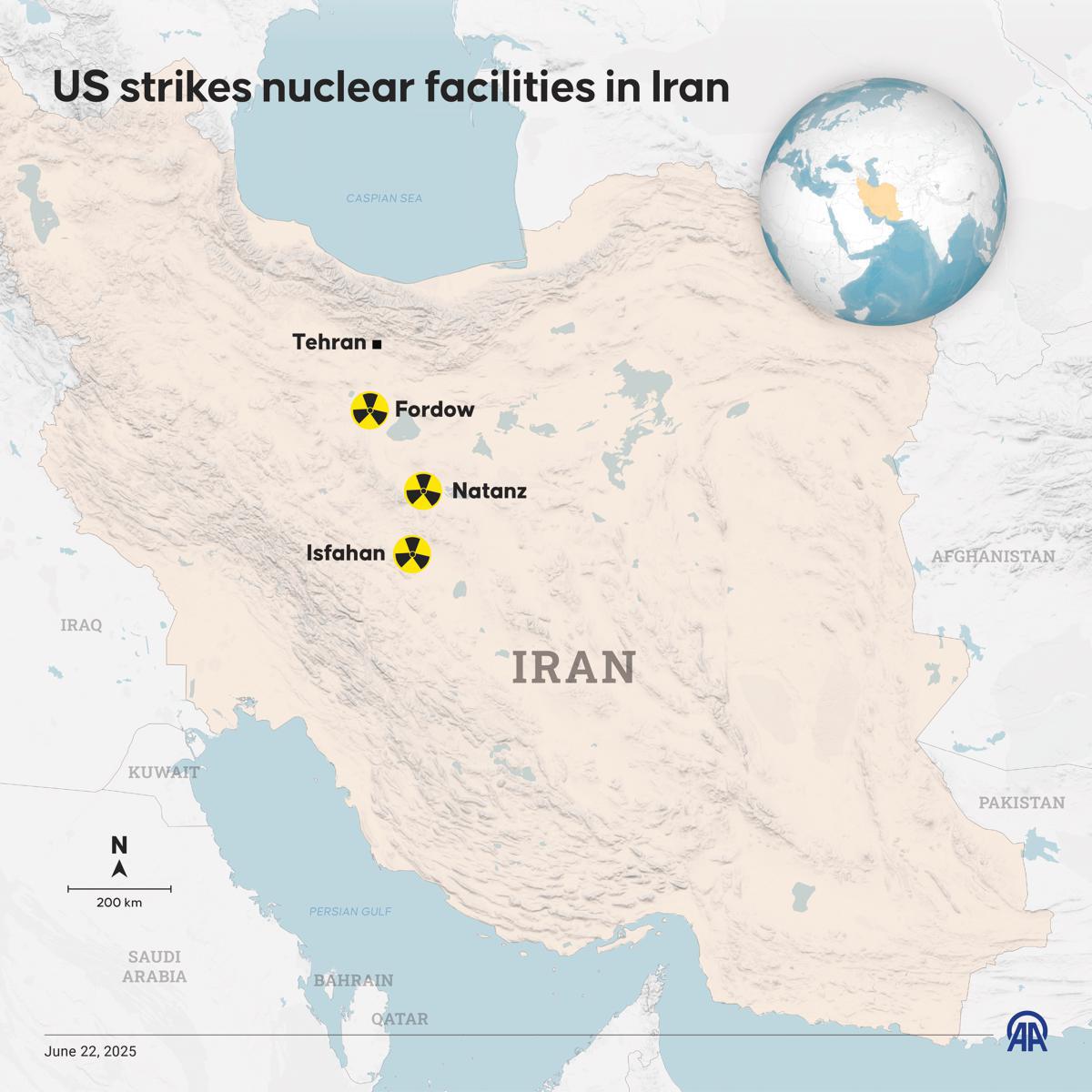
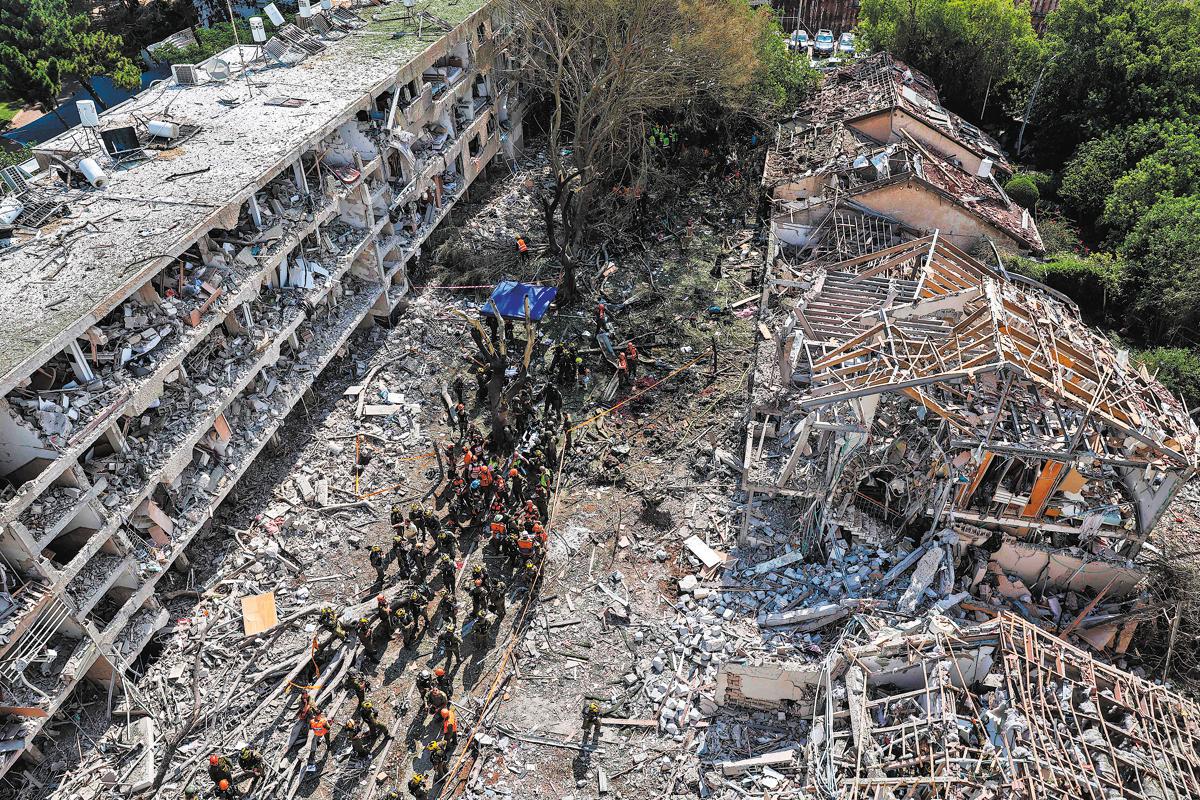
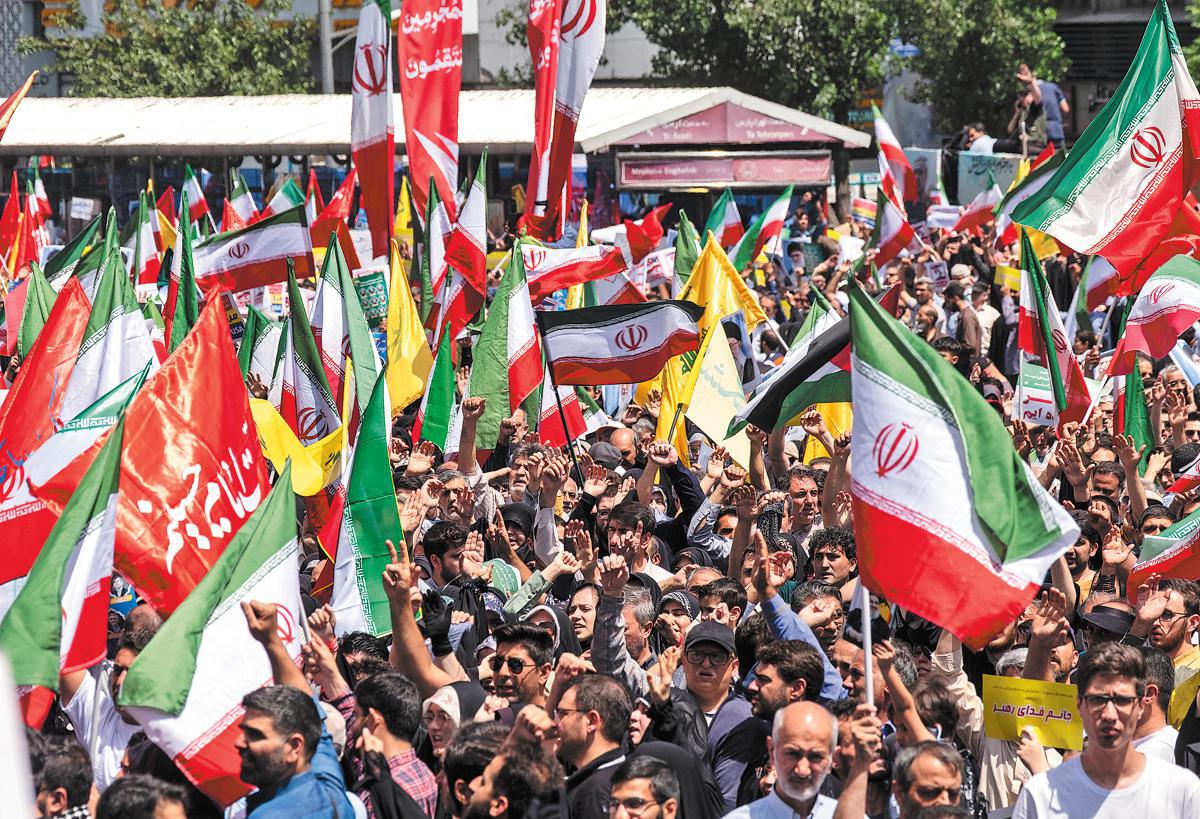
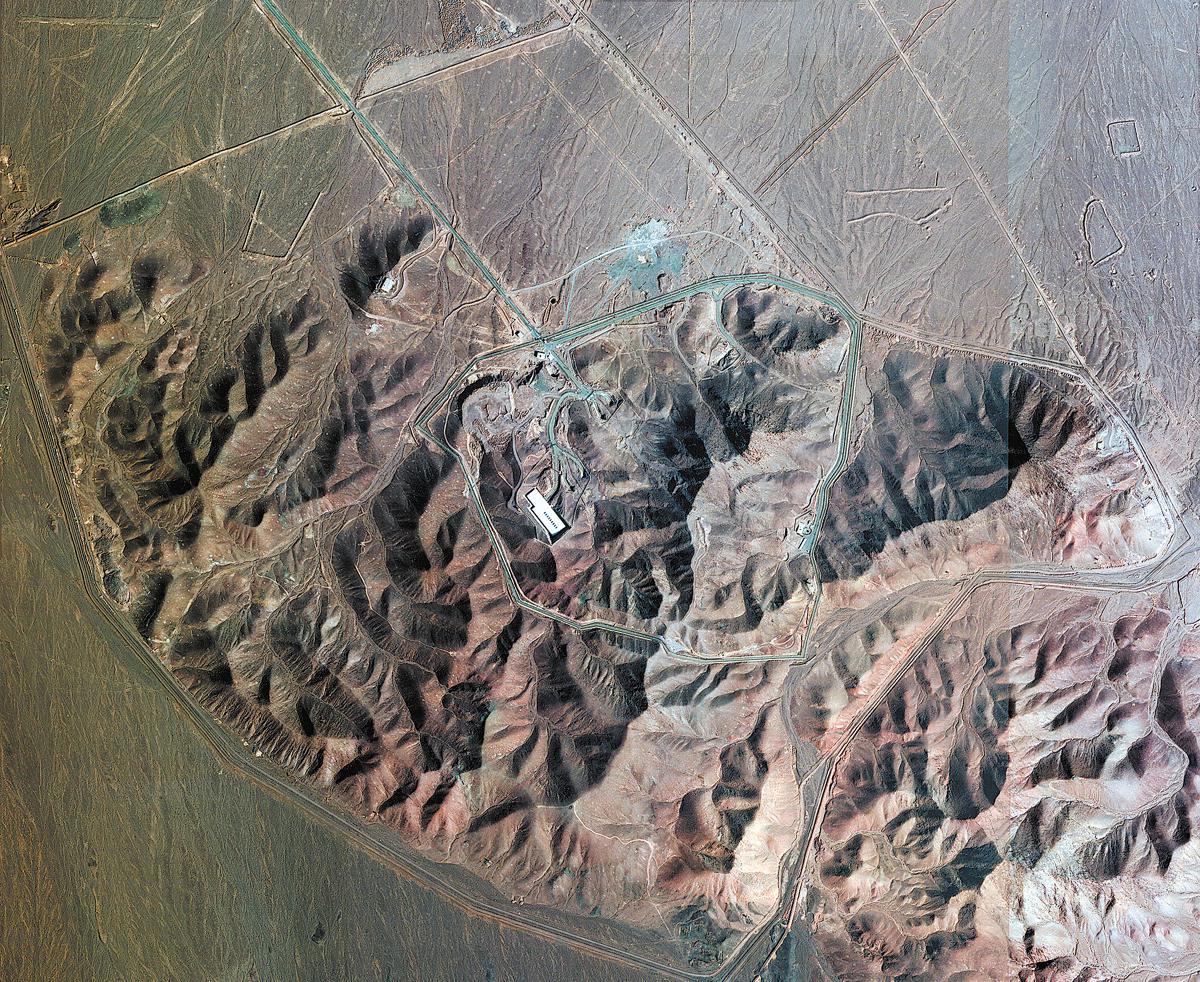

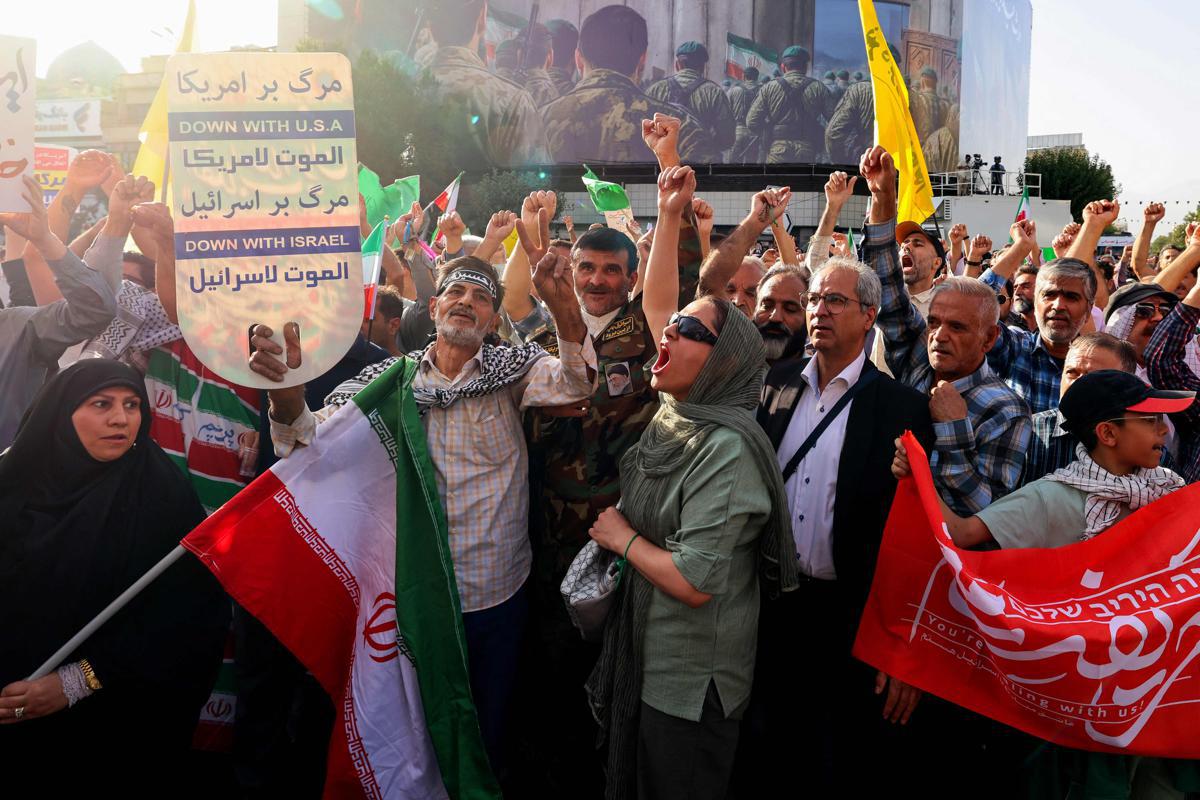
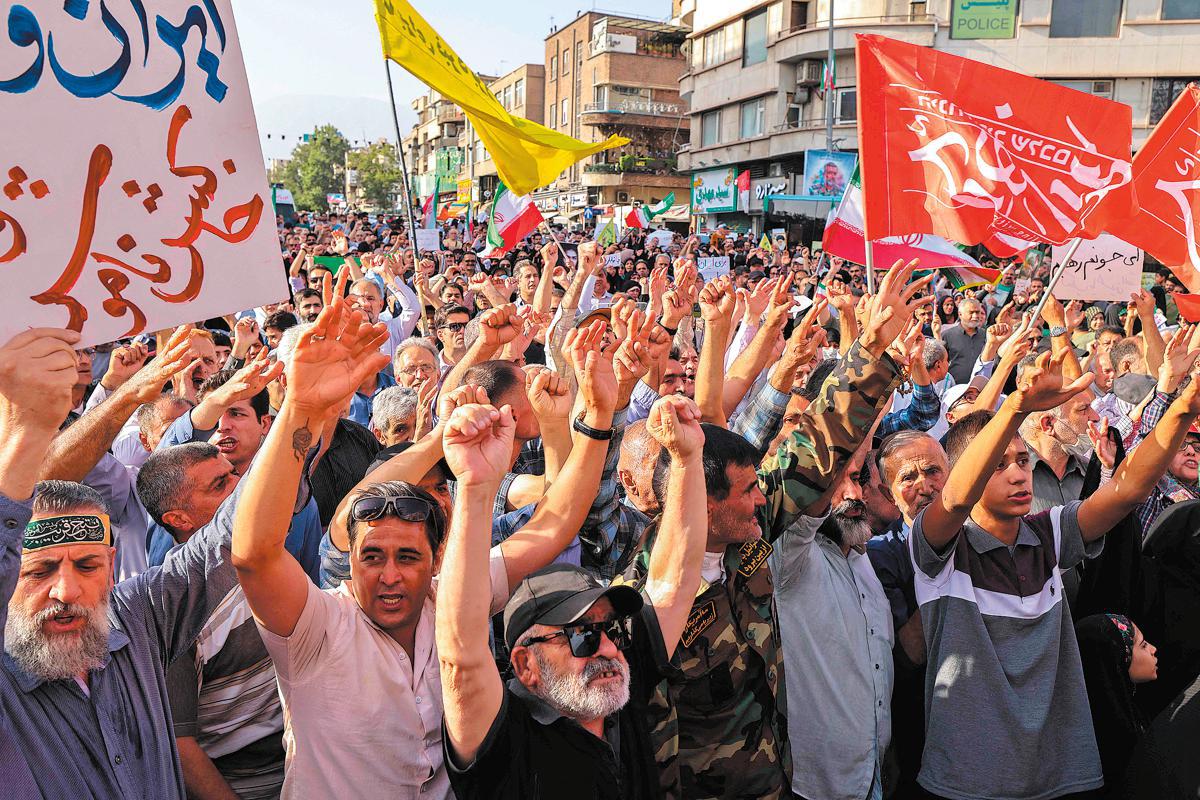
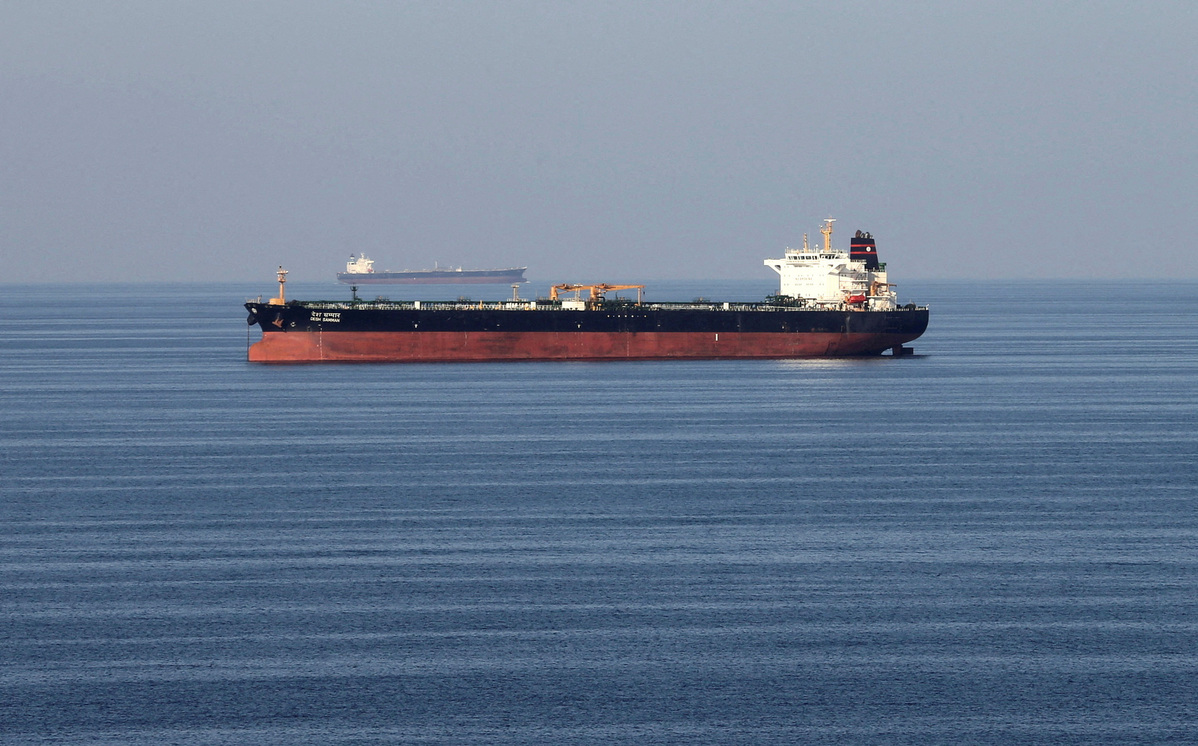
ISTANBUL/WASHINGTON/JERUSALEM - The world awaited Iran's response on Sunday after President Donald Trump said the US had "obliterated" Tehran's most sensitive nuclear sites, joining Israel in the biggest Western military action against the Islamic Republic since its 1979 revolution.
With the damage visible from space after 30,000-pound US bunker-buster bombs crashed into the mountain above Iran's Fordow nuclear site, Tehran vowed to defend itself at all costs. It fired another volley of missiles at Israel that wounded scores of people and flattened buildings in Tel Aviv.
But perhaps in an effort to avert all-out war with the US superpower, it had yet to follow through on its main threats of retaliation against the United States itself - either by targeting US bases or trying to choke off global oil supplies.
Speaking in Istanbul, Iranian Foreign Minister Abbas Araqchi said Tehran would consider all possible responses. There would be no return to diplomacy until it had retaliated, he said.
Trump, announcing the strikes in a televised address, called them "a spectacular military success".
In a step towards what is widely seen as Iran's most effective threat to hurt the West, its parliament approved a move to close the Strait of Hormuz, the entrance to the Gulf where nearly a quarter of the oil shipped around the world passes through narrow waters that Iran controls.
Iran's Press TV said closing the strait would require approval from the Supreme National Security Council, a body led by an appointee of Supreme Leader Ayatollah Ali Khamenei.
Attempting to choke off Gulf oil by closing the strait could send global oil prices skyrocketing, derail the world economy and invite almost certain conflict with the US Navy's massive Fifth Fleet, based in the Gulf and tasked with keeping it open.
Reuters
Pakistan's Prime Minister Shehbaz Sharif reaffirmed Pakistan's unwavering solidarity with Iran on Sunday in a telephone conversation with President Masoud Pezeshkian.
Sharif conveyed Pakistan's condemnation of the US attacks against Iranian atomic energy facilities, which followed Israel's unprovoked and unjustified aggression from June 13, according to a release by the Consulate General of Pakistan in Hong Kong and Macao SARs.
The prime minister expressed deep concerns that the US strikes had targeted facilities that were under the safeguards of the International Atomic Energy Agency. These attacks constituted a serious violation of international law and the IAEA Statute, he said.
While noting Iran's right to self-defence, as enshrined under Article 51 of the UN Charter, Sharif also stressed the need to immediately return to dialogue and diplomacy as the only viable path forward.
Calling for urgent collective efforts to de-escalate the situation, he reiterated Pakistan's readiness to play a constructive role in this context.
Sharif also expressed heartfelt condolences on Iran's loss of precious lives and prayed for the swift recovery of the injured.
President Pezeshkian conveyed his deep appreciation for Pakistan's support. He thanked Prime Minister Sharif, the government and people of Pakistan, including the military leadership, for standing in solidarity with the people and government of Iran.
The two leaders emphasized on the need and urgency of forging unity among the whole community of Muslims at this critical juncture.
VIENNA -- The International Atomic Energy Agency (IAEA) will hold an emergency meeting of its Board of Governors on June 23, after the United States attacked Iran's nuclear facilities overnight, the agency said on Sunday.
"Following attacks on three nuclear sites in Iran -- including Fordow -- the IAEA can confirm that no increase in off-site radiation levels has been reported as of this time," the United Nations agency said on social platform X on Sunday morning.
The agency said it would provide further assessments of the situation in Iran as more information becomes available.
US President Donald Trump said earlier on Saturday that the United States has completed attacks on three nuclear sites in Iran, including Fordow, Natanz and Esfahan.
Iranian Foreign Minister Seyed Abbas Araghchi said Sunday that the US strikes on Iranian nuclear facilities were "outrageous" and "will have everlasting consequences," and Iran "reserves all options" to retaliate.
Before the US attack, IAEA Director General Rafael Grossi said on Saturday that a large nuclear complex in Esfahan has been targeted for a second time during Israel's attacks on Iran over the past nine days, with several more buildings struck.
The facilities targeted either contained no nuclear material or small quantities of natural or low-enriched uranium, meaning any radioactive contamination is limited to the buildings that were damaged or destroyed, Grossi said.
"This nuclear complex in Esfahan -- one of the key sites of the Iranian nuclear program -- has repeatedly been attacked and extensively damaged. Based on our analysis of the nuclear material present, we don't see any risk of off-site contamination. Nevertheless, as I have repeatedly stated, nuclear facilities should never be attacked," Grossi said.
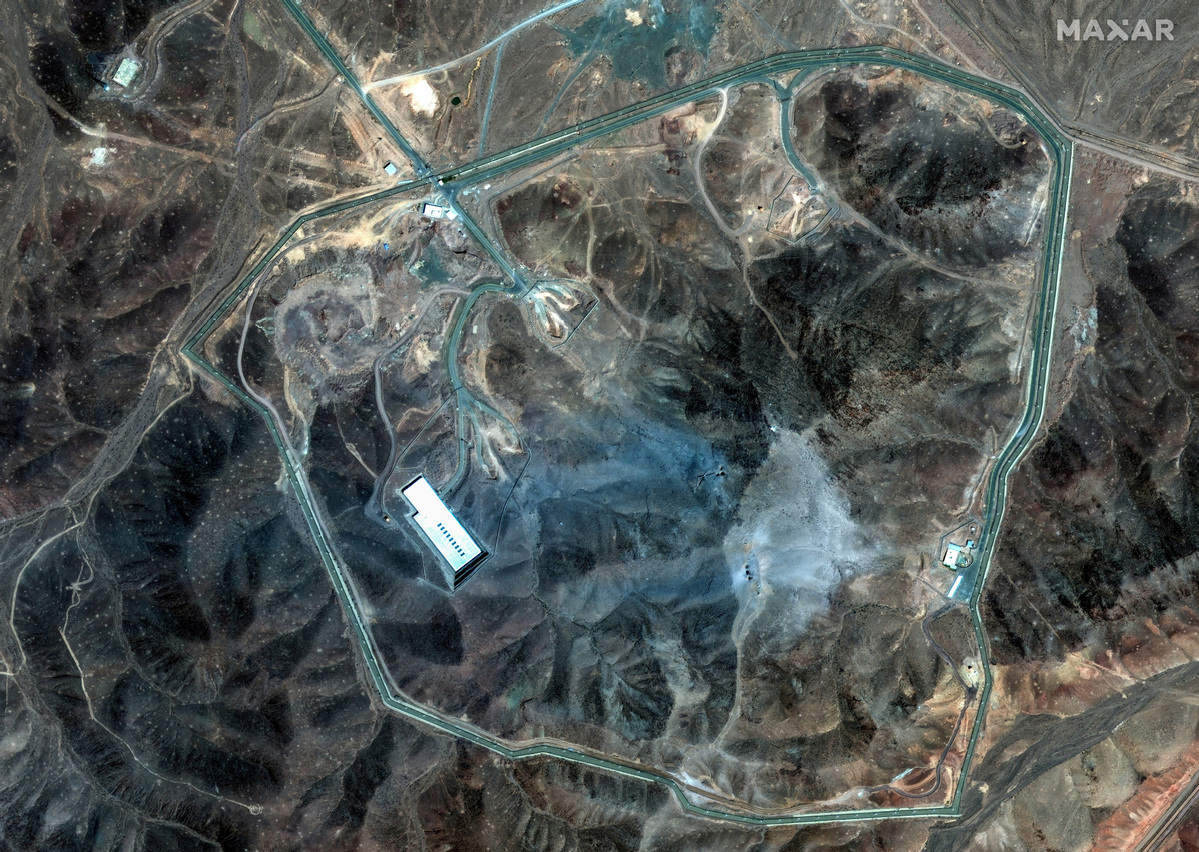
TEHRAN -- Governor of Iran's central Qom province Akbar Behnam Jou said on Sunday that no risk of a nuclear radiation leak exists within a 500-meter radius of Fordow enrichment facility in the province, the semi-official Tasnim news agency reported.
He made the remarks while dismissing concerns about a potential nuclear contamination as a consequence of US attacks earlier in the day, which also targeted two other Iranian nuclear facilities of Natanz and Isfahan, the report said.
Behnam Jou said Iran had staged comprehensive maneuvers in that area, having thoroughly examined all possible scenarios, even the "worst-case" ones.
He assured that people in the province could continue their daily lives in calm.
TEHRAN -- Iranian President Masoud Pezeshkian said on Sunday the US attacks on the country's three nuclear facilities indicated that the United States is the "main factor" behind Israel's hostile actions against Iran.
He made the remarks at a cabinet meeting while strongly condemning the US attack on Saturday on Natanz, Fordow and Isfahan nuclear facilities, according to a statement published on the website of his office.
Pezeshkian said although the United States initially was trying to deny its role in Israeli strikes against Iran, it eventually joined the war.
He added the Iranian armed forces' "powerful" attacks against Israel Sunday morning were in fact a response to the US "aggressive" policies.
Meanwhile, Iran's Islamic Revolution Guards Corps (IRGC) said in a statement that by directly attacking the country's nuclear facilities, the United States practically placed itself at the forefront of the "aggression" against Iran.
It said in response to "such aggressions and crimes," Iran would continue its "precise, targeted and formidable" strikes against Israel's infrastructure, strategic centers and interests.
"The aggressors should wait for regret-inducing responses," the IRGC warned in the statement.
US President Donald Trump announced the completion of his country's attacks on the three Iranian sites in a post on social platform Truth Social.
The attacks came as Israel has since June 13 launched major airstrikes on different areas in Iran, including nuclear and military sites, killing several senior commanders, nuclear scientists and a large number of civilians.
Iran has retaliated Israel's attacks with missile and drone strikes. As of Saturday, more than 400 Iranians have been killed and over 3,000 wounded, according to Iran's Health Ministry. In Israel, the death toll stands at 24, according to local authorities.
After talks in Geneva, Switzerland on Friday about the Israel-Iran conflict yielded little fruit, the European Union has been urged to play a more independent role in peace negotiations, even as the situation in the Middle East worsened following the United States' bombing of nuclear sites in Iran.
"The discussions and proposals made by the Europeans in Geneva were unrealistic. Insisting on these positions will not bring Iran and Europe closer to an agreement," Reuters quoted a senior Iranian official as saying on condition of anonymity.
For Di Dongsheng, dean of the School of Global and Area Studies at Renmin University of China, the continued Israel-Iran conflict has put Europe in an awkward position.
"Relying heavily on the oil exports from the Middle East, Europe now faces a high risk of an energy shortage if the situation worsens and the Strait of Hormuz gets closed," he told China Daily. "Besides, what Israel has been committing in Gaza, recognized by many as a massacre, has aroused quite fierce oppositions from the European people and certain political parties."
Greta Thunberg, the young Swedish climate activist, earlier sailed with others toward Gaza earlier this month, in an attempt to open a humanitarian channel into the region that is under an Israel blockade. She was subsequently deported by Israeli forces.
Yet politically, major European powers stand more with Israel and some right-wing politicians in a number of European nations are almost as closely aligned with Israel as the US, Di said, listing Germany's Chancellor Friedrich Merz and his recent quote in which he thanked Israel for "doing the dirty job for us all" as an example.
Those sorts of attitudes may further split Europe, which is already divided on multiple major issues, he said.
Jian Junbo, director of the Centre for China-EU Relations at Fudan University, said that Iran's peaceful use of nuclear energy had become at the center of the issue. But Jian said Israel potentially ignited a powder keg in the Middle East with its sudden attack on Iran on June 13 after claiming Iran was "funding and directing terrorist activities via its proxies across the Middle East, while advancing toward obtaining a nuclear weapon".
"If the Middle East situation gets out of control, more powers such as the Houthi group and the Kurdish forces might rise there, turning it into bigger chaos," he said. "In that case, Europe's interests will be more fragile."
Mick Wallace, a former member of the European Parliament, said: "Europe is not capable of acting independently today ... This is a big problem for Europe now for as long as Europe fails to adapt an independent policy of its own, the more insignificant Europe will become on the world stage."
He also said that Europe should "condemn this illegal US act of aggression against Iran and EU member states should break off all business links with Israel while they continue to behave as a lawless apartheid state".
President of France Emmanuel Macron wrote on X: "I am convinced that a path exists to end war and avoid even greater dangers. To achieve this, we will accelerate the negotiations led by France and its European partners with Iran."
Kaja Kallas, the EU's foreign affairs chief, posted on X that all sides should step back.
"Iran must not be allowed to develop a nuclear weapon, as it would be a threat to international security," she added.
EU Foreign Ministers will discuss the situation again on Monday, she added.
TEHRAN -- Iran on Sunday reported explosions near the southern city of Bushehr, where a nuclear power plant is located, and in the central province of Yazd as a result of Israel's attacks, according to the semi-official Fars news agency.

China strongly condemns the US attacks on Iran and bombing of nuclear facilities under the safeguards of the International Atomic Energy Agency, a Foreign Ministry spokesperson said on Sunday after US President Donald Trump announced that the United States carried out strikes on three nuclear facilities in Iran — Fordow, Natanz and Esfahan.
The actions of the US seriously violate the purposes and principles of the United Nations Charter and international law, and have exacerbated tensions in the Middle East, the spokesperson said in a statement.
China calls on the parties to the conflict, Israel in particular, to reach a ceasefire as soon as possible, ensure the safety of civilians, and start dialogue and negotiation, the statement said.
China stands ready to work with the international community to pool efforts together and uphold justice, and work for restoring peace and stability in the Middle East, the spokesperson added.
JERUSALEM -- The Israel Defense Forces (IDF) said in a statement that its fighter jets struck two warplanes at the Dezful Airport in western Iran on Sunday morning.
The statement noted that in separate strikes earlier in the morning, eight missile launchers were "neutralized," including six that were poised to fire at Israeli territory.
It added that on Saturday evening, approximately 20 Israeli fighter jets struck dozens of military targets in Iran.
Among the targets hit were a military site housing components for explosive production, weapons storage and manufacturing facilities, and air defense systems, according to the statement.
It added that the IDF also targeted military infrastructure at Isfahan Airport to prevent the Iranian air force from utilizing the site.
ISTANBUL -- The US attack on Iran is an outrageous, grave and unprecedented violation of fundamental principles of the Charter of the UN and international law, said Iranian Foreign Minister Seyed Abbas Araghchi on Sunday in a press conference in Istanbul.
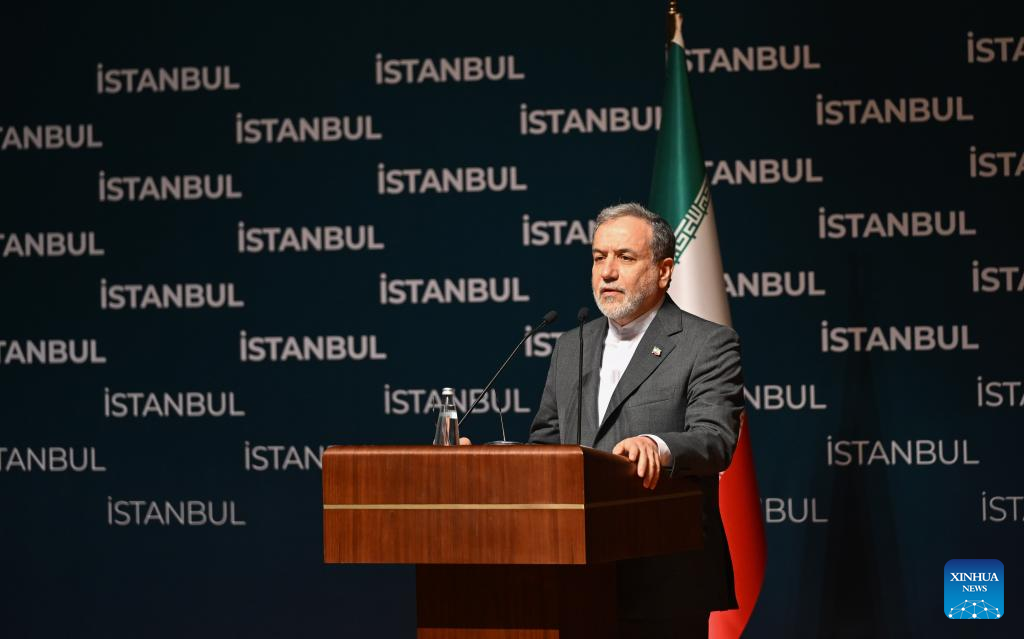
ISTANBUL -- Iranian Foreign Minister Seyed Abbas Araghchi on Sunday strongly condemned the US military strikes on Iran's nuclear facilities, saying Tehran has multiple options under consideration in response to this "red line" violation.
"The US attack on Iran is an outrageous, grave, and unprecedented violation of the fundamental principles of the UN Charter and international law," Araghchi said at a press conference in Istanbul.
He added that the "lawless" US administration is "solely and fully" responsible for the consequences of its act of "aggression."
"Of course, the door to diplomacy should be always kept open," Araghchi said. "But this is not the case right now. My country is under attack, under aggression, and we have to respond based on our legitimate right of self-defense. We will do so for as long as needed and necessary."
"We are now calculating the damages," he added, urging the world and international organizations, including the International Atomic Energy Agency, to act in accordance with their responsibilities in the face of this "violation of international law."
Araghchi also announced that he will meet with Russian President Vladimir Putin on Monday in Moscow to discuss the latest developments following the US strikes.
Araghchi is in Turkiye to attend the 51st session of the Organization of Islamic Cooperation Council of Foreign Ministers in Istanbul.
ISLAMABAD -- Pakistan on Sunday condemned the US attacks on three Iranian nuclear facilities, showing grave concerns at the possible further escalation of tensions in the region.
"The unprecedented escalation of tension and violence, owing to ongoing aggression against Iran, is deeply disturbing. Any further escalation of tensions will have severely damaging implications for the region and beyond," the Pakistani Ministry of Foreign Affairs said in a statement.
Pakistan emphasized the imperative need to respect civilian lives and properties and immediately bring the conflict to an end, the foreign ministry said, adding that all parties must adhere to international law, particularly the international humanitarian law.
It added that recourse to dialogue and diplomacy, in line with the principles and purposes of the UN Charter, remains the only viable pathway to resolve the crises in the region.
Asia-Pacific countries have expressed their willingness to find a political solution to US and Israeli attacks against Iran while some voiced condemnation of or expressed concern over US attacks against Iran's atomic energy facilities.
The head of the Pakistani parliament's defense committee said, "The US aggression against Iran's nuclear facilities is a war crime."
Iraqi government spokesperson Bassem Al-Awadi said, "Targeting nuclear facilities inside Iran is a dangerous threat to security and peace in the Middle East and exposes regional stability to great risks."
Iraq "expresses its deep concern and strong condemnation of the targeting of nuclear facilities" in Iran, Bassem Al-Awadi said on Sunday. "This military escalation constitutes a grave threat to peace and security in the Middle East and poses serious risks to regional stability," he added.
The Saudi Arabia's Foreign Ministry, in a statement on X platform, "affirmed its condemnation and denunciation of violating the sovereignty of the Islamic Republic of Iran, expressing the need to exert all efforts to exercise restraint, de-escalate, and avoid escalation."
The kingdom also called on the international community to boost efforts in such "highly sensitive circumstances" to reach a political solution to end the crisis, Arab News reported.
Oman, which was mediating nuclear talks between Washington and Teheran, on Sunday strongly condemned US strikes on nuclear sites in Iran.
The Gulf sultanate "expresses deep concern, denunciation and condemnation of the escalation resulting from the direct air strikes launched by the United States on sites in the Islamic Republic of Iran", the official Oman News Agency said.
Qatar, host of the biggest US military base in the Middle East, on Sunday said the foreign ministry "warns that the current dangerous escalation in the region may lead to catastrophic consequences at both the regional and international levels."
Lebanese President Joseph Aoun, in statement released by the Lebanese Presidency on X, said, "The bombing of Iranian nuclear facilities raises fears of an escalation of tensions that could threaten security and stability in more than one region and country.
Aoun called for restraint and the launch of constructive and serious negotiations to restore stability to the countries of the region and avoid further killing and destruction.
The Palestinian Resistance committees stated, "The attack on the Fordow, Natanz, and Isfahan facilities is an act of aggression and a threat to the entire region, and requires a united stance from all the free people of the nation to confront these arrogant aggressors," according to Mehr News Agency of Iran.
Both governments of Japan and the Republic of Korea are reportedly holding meetings on the latest situation.
In New Zealand, Foreign Minister Winston Peters instead clarifying whether New Zealand supported President Trump's actions, said the crisis is "the most serious I've ever dealt with" and that "critical further escalation is avoided."
"Diplomacy will deliver a more enduring resolution than further military action," he said.
Australia, which evacuated embassy employee in Teheran on Friday, said it will "continue to call for de-escalation, dialogue and diplomacy". But a government official said in a written statement: "We note the US President's statement that now is the time for peace."
Jan Yumul contributed to this report.

JERUSALEM/TEHRAN -- Ballistic missiles fired from Iran into central and northern Israel on Sunday morning wounded 26 people, two of whom in moderate condition, Israel's national emergency service Magen David Adom reported.
The Israeli police said that the strike, including two barrages of a total of about 30 missiles, directly hit the cities of Tel Aviv and Ness Ziona in central Israel and Haifa in the north, causing heavy damage to residential buildings, roads and vehicles.
It was the first missile strike from Iran towards Israel after a pause of around 29 hours, and the first since the United States bombed Iran's nuclear facilities.
Shortly after the Iranian attack, the Israel Defense Forces (IDF) said in a statement that its air force struck and destroyed the missile launchers in Iran that carried out the latest strike targeting Israel.
Hours before the missile strike and following the US bombing, Israel closed its airspace in an apparent precautionary measure, the Israel Airports Authority announced.
The IDF's Home Front Command also announced additional emergency rules for the public, including bans on educational activities, gatherings and workplaces, except for essential sectors.
Israeli Prime Minister Benjamin Netanyahu said in a statement following the US attack in Iran that it was carried out in full operational coordination with Israel.
Iran's Islamic Revolution Guards Corps on Sunday confirmed the attack, saying that the fresh wave of attacks targeted Ben Gurion Airport in Tel Aviv and a biological research center, among others.
In a statement published on its official news outlet Sepah News, it also announced the beginning of its 20th wave of strikes against targets inside Israel.
The Islamic Revolution Guards Corps said the new wave of attacks featured a combination of long-range solid- and liquid-fuel missiles equipped with "devastating" warheads and employing new tactics to render Israel's air defense ineffective.
It added the strikes targeted backup bases as well as different layers of the command and control centers.
On June 13, Israel launched major airstrikes on different areas in Iran, including nuclear and military sites, killing several senior commanders, nuclear scientists and civilians.
Iran retaliated with missile and drone attacks. As of Saturday, more than 400 Iranians have been killed and over 3,000 wounded, according to Iran's Health Ministry. In Israel, 24 civilians were killed by Iranian missile strikes, according to local authorities.
Iran "condemns the brutal US military aggression against Iran's peaceful nuclear facilities" and reserves the right to defend itself with full force, said an official statement by the Iranian Foreign Ministry on Sunday.
The US military assault on Iran's peaceful nuclear facilities is not only a blatant and unprecedented violation of the UN Charter -- particularly the principles prohibiting the use of force and requiring respect for states' territorial integrity and national sovereignty-- but also a violation of UN Security Council Resolution 2231, the statement said.
"The world must not forget that it was the United States that, in the midst of a diplomatic process, betrayed diplomacy by supporting the genocidal and lawbreaking Israeli regime to impose a war of aggression on the Iranian nation. Now, in completion of that regime's unlawful and criminal acts, the United States itself has launched a dangerous war against the Islamic Republic of Iran," said the statement released on X platform.
Iran "is resolved to defend Iran's territory, sovereignty, security and people by all force and means against the United States' criminal aggression," said the statement.
At a news conference earlier, US President Donald Trump said Saturday local time that Iran's key nuclear facilities had been "completely and totally obliterated". US military struck Iran's atomic energy sites at Fordow, Natanz and Isfahan. But Iran had evacuated these three nuclear sites "a while ago," said Hassan Abedini, deputy political director of Iran's state broadcaster.
Trump also threatened that future attacks against Iranian targets will be "far greater and a lot easier". "If peace does not come quickly, we will go after those other targets with precision, speed and skill," he said at his news conference.
The Iranian Foreign Ministry also urged the UN Security Council to convene an emergency session to "unequivocally condemn this criminal act of aggression by the United States against Iran" and to hold the United States accountable for its egregious violation of the fundamental principles of United Nations Charter and of the norms of international law.
The ministry also called on the IAEA Board of Governors to immediately convene and "carry out its legal responsibility in response to this dangerous US attack on Iran's peaceful nuclear facilities, all of which have been under the Agency's full safeguards and monitoring."
The "war-mongering and lawless regime of the United States of America" is held fully responsible for the dangerous consequences and far-reaching implications of this egregious act of aggression and heinous crime, the ministry said.
Jan Yumul contributed to this report.
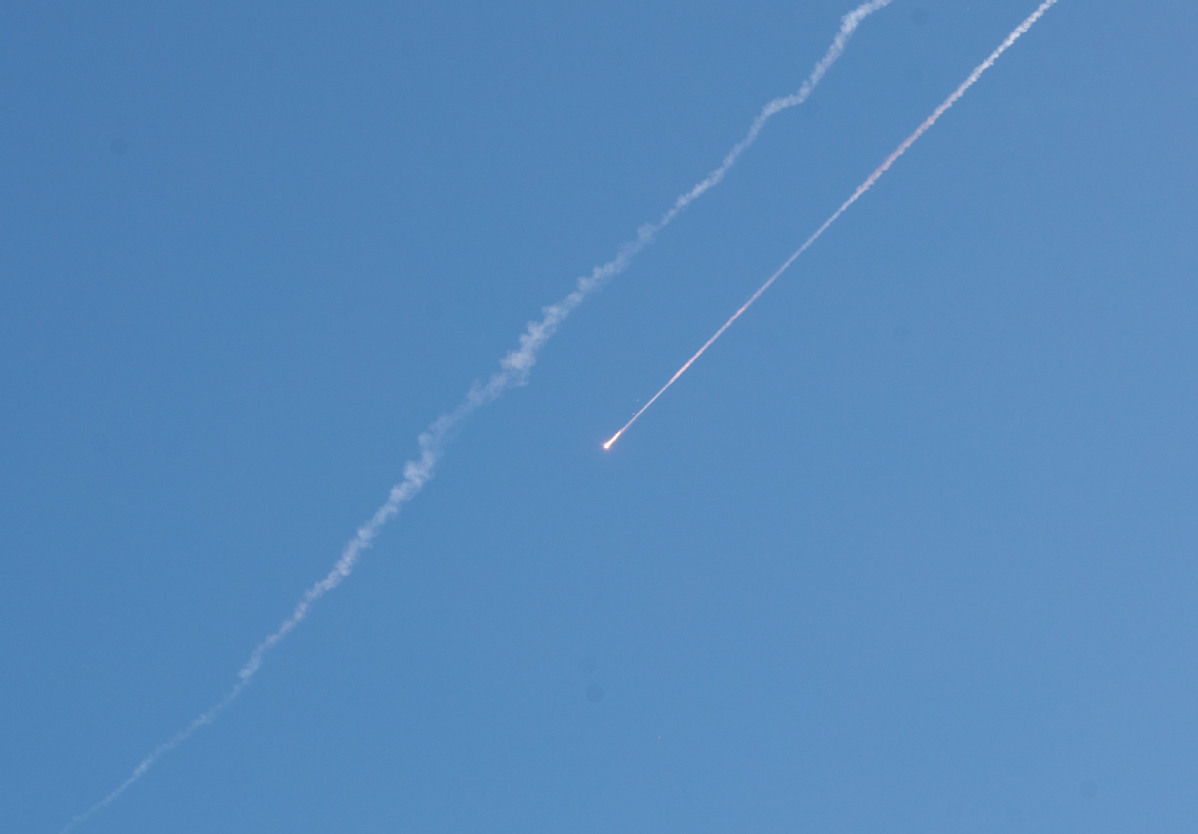
JERUSALEM - Sirens sounded across central, northern Israel and Israel-controlled Jerusalem as Iran launched a new wave of ballistic missiles.
Israelis in affected areas were instructed to remain in bomb shelters.
It marked the first Iranian ballistic missile strike on Israel in over a day -- and the first since the United States attacked Iran's three nuclear facilities.
Israel closed its airspace in an apparent precautionary measure following the US strike on Iran's nuclear facilities, the Israel Airports Authority announced earlier.
A statement from the Israel Defense Forces said with the approval of the Defense Minister Israel Katz, and following the situational assessment, it was determined that as of Sunday at 03:45 am (0045 GMT), immediate changes will be made to the Home Front Command instructions.
As part of the changes, it was decided to shift all areas of the country from Partial and Limited Activity to Essential Activity. The instructions include a prohibition on educational activities, gatherings and workplaces, except for essential sectors, said the statement.
US President Donald Trump said earlier on Saturday that the United States has completed attacks on three nuclear sites in Iran, namely "Fordow, Natanz and Esfahan."
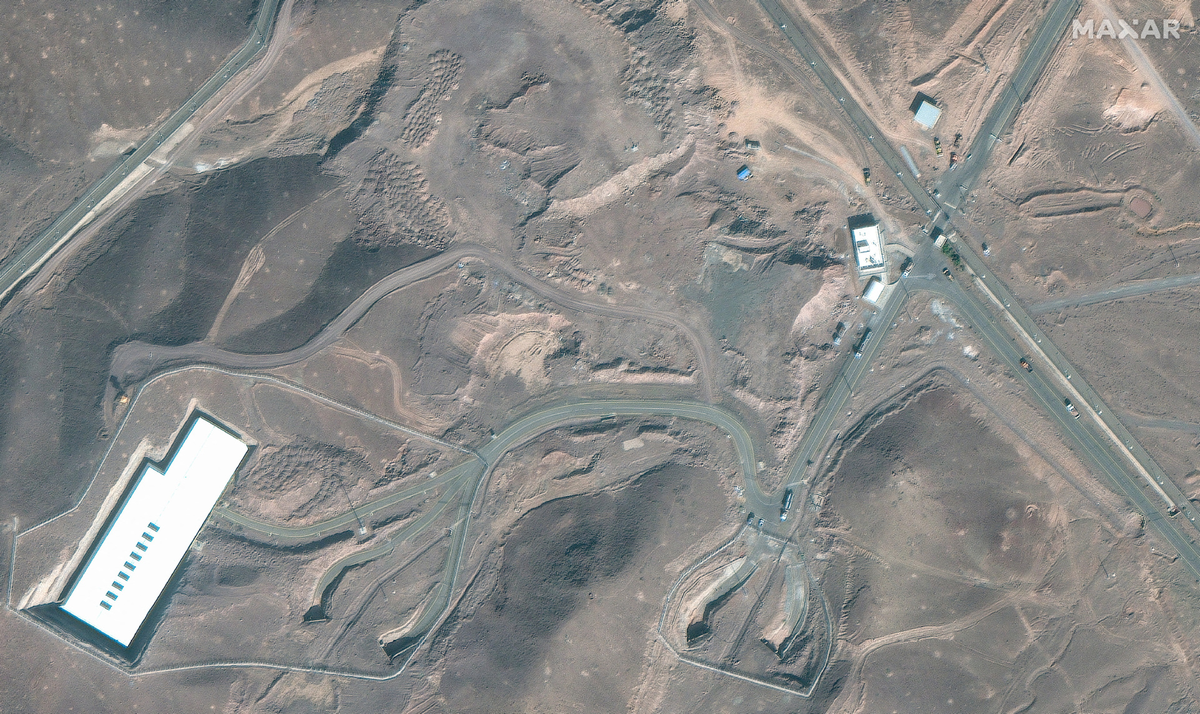
The United States' unilateral military strikes targeting Iranian nuclear facilities at Fordow, Natanz and Isfahan constitute a reckless escalation and a flagrant violation of international law. This direct intervention in the volatile Israel-Iran conflict violates the sovereignty of Iran and fundamental principles of the UN Charter. Such unilateralism undermines the rules-based international order and sets a dangerous "might-makes-right" precedent.
Although Washington is suggesting that the US' bombing of multiple Iranian nuclear sites on Saturday is a contained move to prevent the Islamic republic producing nuclear weapons, it has all the hallmarks of another "washing powder" moment with Israel resolutely trying to drag the US into a war with Iran.
As House Representative Hakeem Jeffries said, President Donald Trump didn't seek Congressional authorization for the use of military force and he therefore "shoulders complete and total responsibility" for the risks of entangling America in a disastrous war. This marks a stark reversal from Trump's "America First" campaign pledge to avoid foreign conflicts.
The attacks may have already opened Pandora's box. What the world should be concerned about now is the immediate consequences and implications of the strikes, which not only violated Iran's sovereignty and territorial integrity, but also breached multiple international laws and rules on nuclear security.
International law provides clear protection for nuclear facilities worldwide. Article 56 of the Additional Protocol 1 to the Geneva Conventions expressly prohibits attacks on nuclear plants, because such attacks can cause nuclear leaks jeopardizing the lives of thousands of civilians. The International Atomic Energy Agency, too, has, in many of its resolutions, condemned attacks on nuclear facilities as gross violations of international law and the UN Charter.
The attacks came amid intensive diplomatic efforts to reach a political resolution of the Iran nuclear issue. Although the US signaled that after the attacks its bilateral talks with Iran can continue, the Saturday attacks are likely to have derailed the whole process aimed at securing a negotiated settlement of the issue.
The attacks also came at a time that Iran's increasingly effective response to Israel's aggression has pushed the latter to a breaking point dragging their conflict in the direction of a war of attrition that Israel is in no position to wage.
But although the US' Saturday attacks may have seemed to help Israel reverse the situation, they have only served to push the situation further toward the abyss.
United Nations Secretary-General António Guterres rightly warned the actions pose a "direct threat to international peace and security", risking uncontrolled escalation with catastrophic humanitarian consequences for civilians already suffering across the Middle East.
Trump's threatening of more strikes "if peace does not come quickly", issued shortly after the bombings, starkly underscores this volatility. Further conflict will inevitably undermine global stability by jeopardizing peace, energy security and disrupting critical shipping lanes, sending shockwaves through a fragile world economy.
As the world stands on the brink of a cataclysm, it is imperative that reason prevails. Diplomacy, not unilateral force and threats of escalation, is the only viable path to sustainable security and preventing nuclear proliferation.
